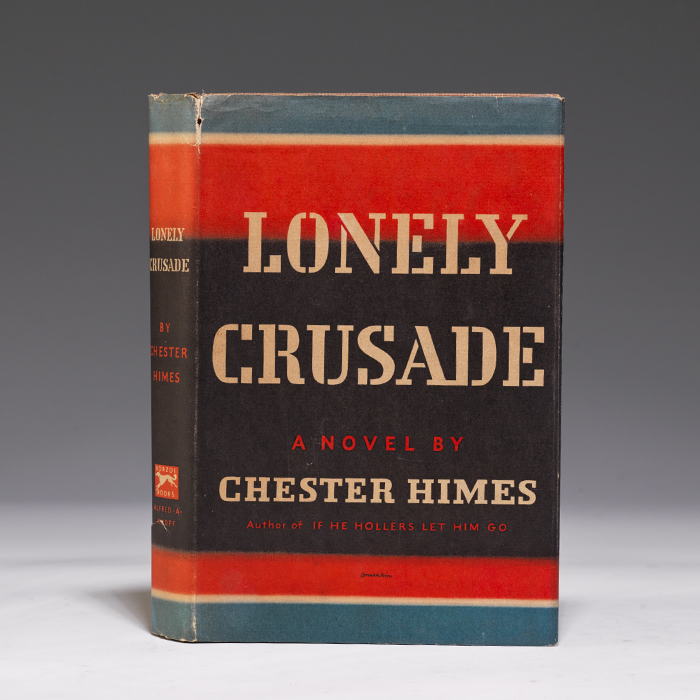
"THE QUINESSENTIAL AFRICAN AMERICAN WRITER": VERY SCARCE FIRST EDITION OF LONELY CRUSADE, 1947, INSCRIBED BY CHESTER HIMES
HIMES, Chester . Lonely Crusade. New York: Alfred A. Knopf, 1947. Octavo, original russet cloth, original dust jacket. $3200.
First edition of Himes' still controversial second book, distinctly pivotal in introducing how racism became "the dominant subject" of his writing, one of the few works written in America before he left to spend most of his years in exile, an especially elusive copy inscribed by him while living in France, "All best Chester Himes, Venelles France,” in original dust jacket.
During his lifetime Himes, who died in 1984, was "more honored in Europe than in the U.S." and spent most of his adult years in Mexico, France and Spain (New York Times). His acclaimed Harlem-based detective novels, written in English while in exile, earned him the prestigious Gran Prix de Litterature Polici. Lonely Crusade, his second book and one of the few written while still in America, was early subject to much criticism on all sides, even as it won high praise for its explosive power: a "novel of fear, of the fear ever present in the mind of a Negro living in a white man's America." In its pages, Himes refuses to back away from that reality, as he also evokes "every man's struggle to find himself and his place in the world" (New York Times). In one of his two autobiographies Himes noted: "Camus once said that racism is absurd… not only does racism express the absurdity of the racists, but it generates absurdity in the victims" (My Life of Absurdity). This novel set a standard for how racism became "the dominant subject" of Himes' works. "He did not choose the subject. it was thrust upon him… but he drove deeper into the subject than anyone ever had before" (Milliken, Chester Himes, 306). Set in L.A. during WWII, the novel tells of the struggles faced by its protagonist, a college-educated Black man, who battles racism as a recruiter for an aircraft company and labor organizer. Himes similarly experienced crippling racism while briefly living in California, later recalling: "Los Angeles hurt me racially as much as any city I have ever known… it was the lying hypocrisy that hurt me" (Quality of Hurt, 73).
"Few writers resist classification as persistently as Himes. He is, very nearly, sui generis" (Milliken, 2). This groundbreaking work, featuring "one of Himes' most arresting characters," also asserts his importance as "the quintessential African American writer. His work stands as a testament to his unbridled masculinity, his piercing and explosive candor, and his classical aesthetic vision… [his] willingness to be so blunt—with a kind of street edge… means that he had, as one of Himes' biographers has contended, 'aired Black sentiments largely unspoken in public, any public, at the time'" (Story, Dissonant Chord, 284, 294). Himes' novels offer "the most complete and perfect statement of the nature of native American racism to be found in American literature, and one of the most profound statements about the nature of social oppression, and the fear it generates in all of modern literature" (Milliken, 307). To preeminent Black writer Ishmael Reed, Lonely Crusade belongs in a short list of "Classics of the Future" (Cheuse, 236). First edition, first printing: with "First Edition" on copyright page. Not in Blockson.
Book fine: small closed tear to lower spine of otherwise colorful about-fine dust jacket.